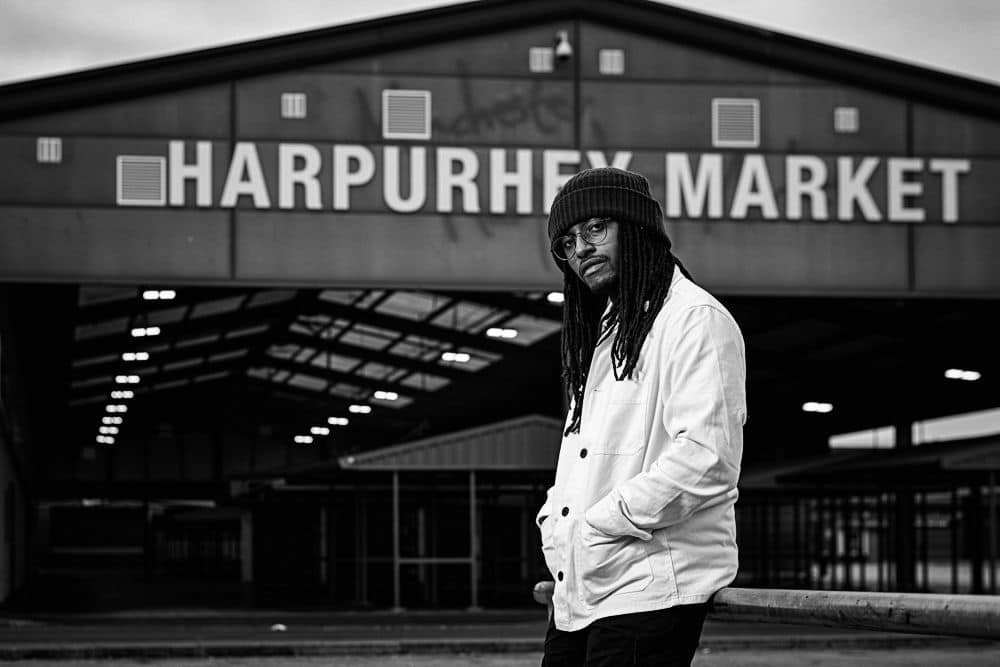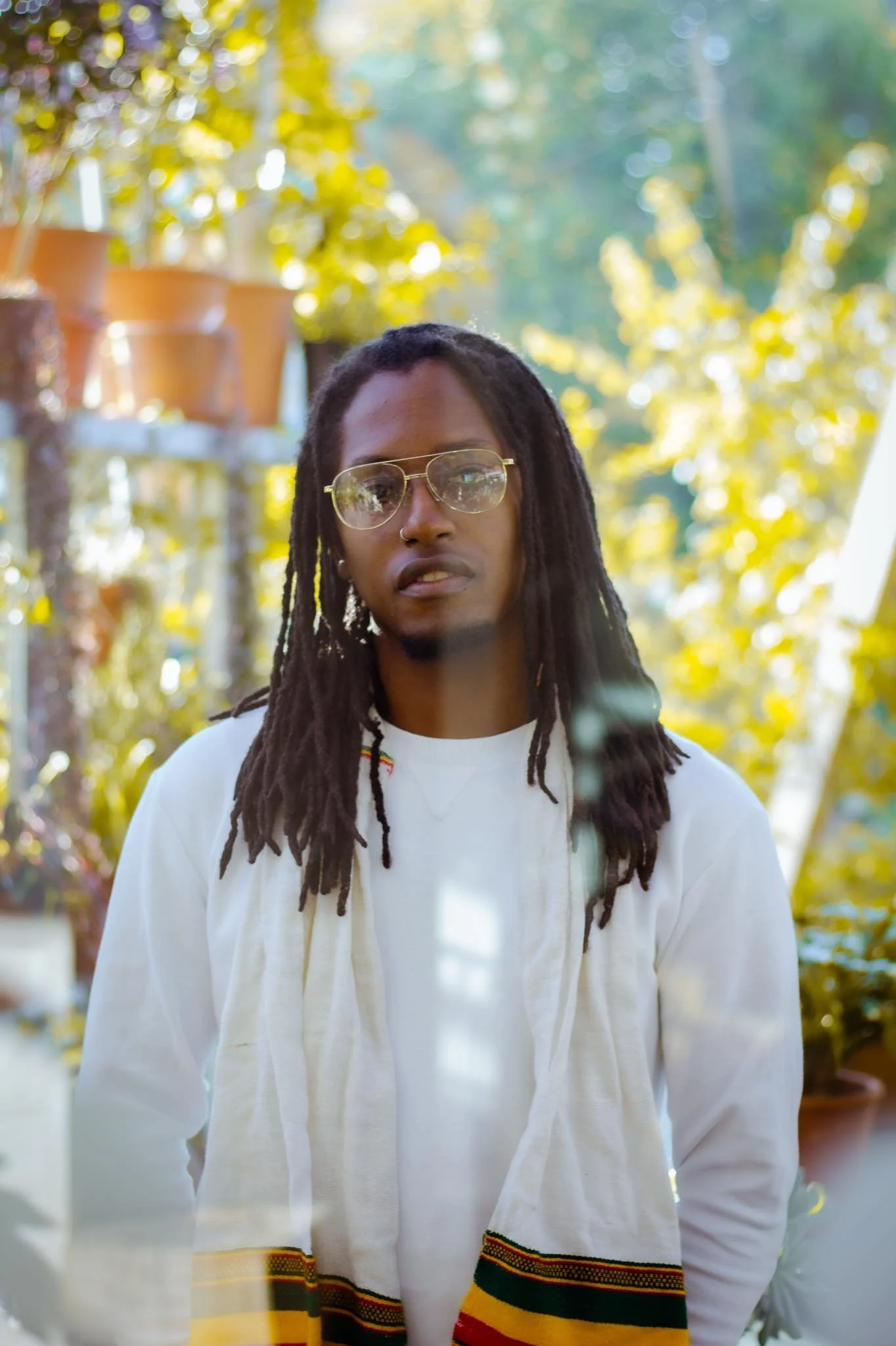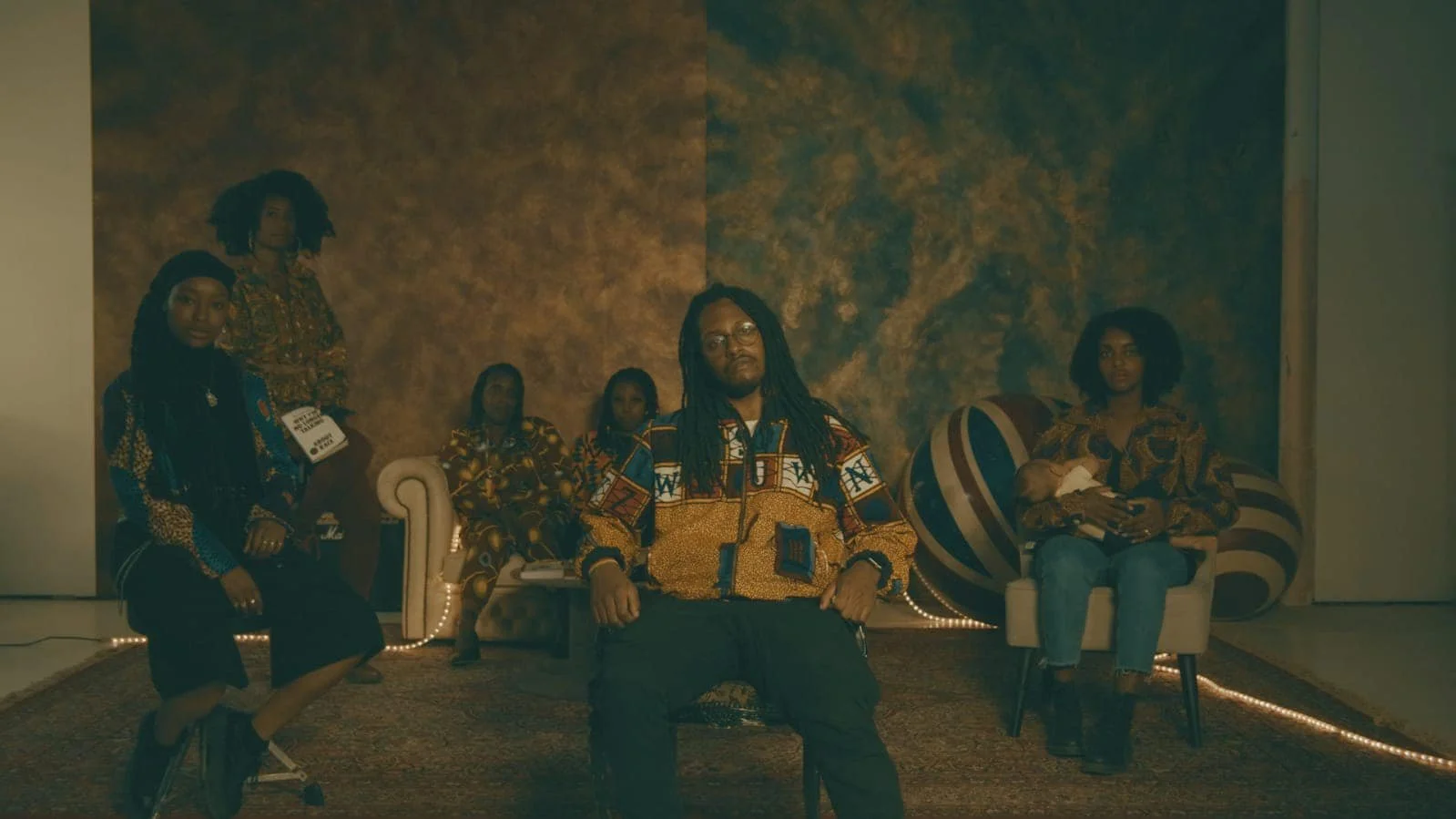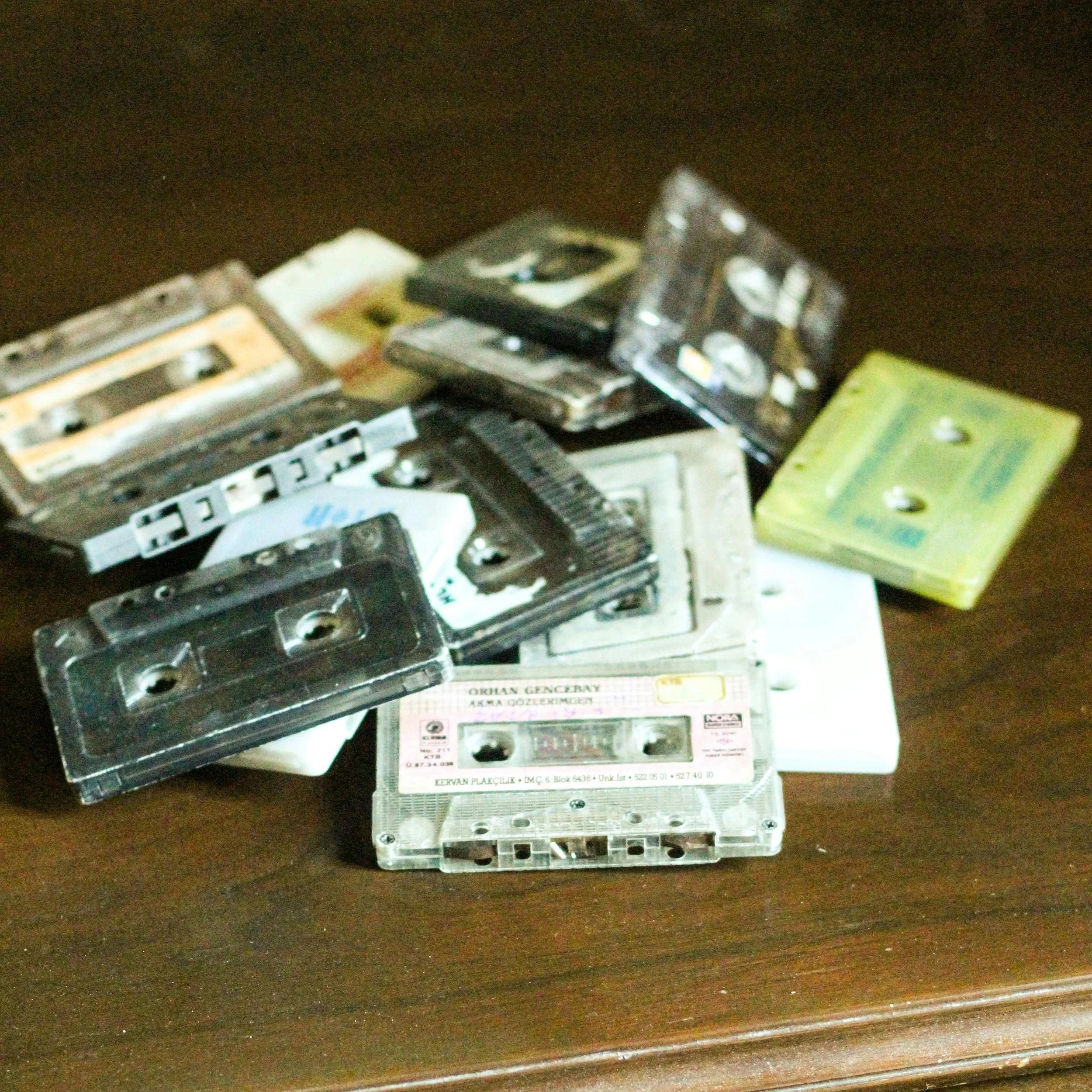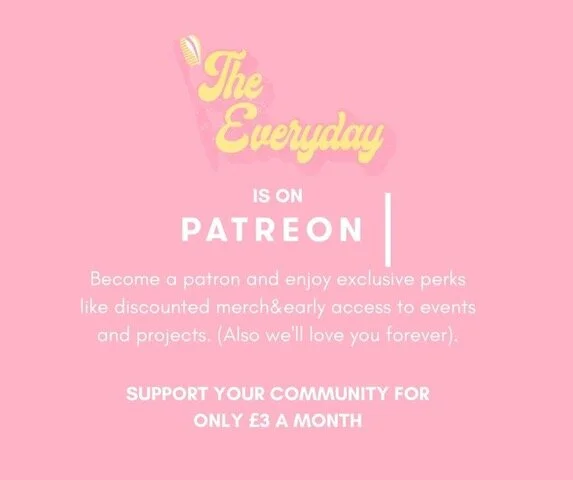Talking to: J. Chambers
© @kennybrownphoto
J Chambers is a man with a relentless schedule. On the day we caught up with the Mancunian wordsmith and activist last month, we were politely squeezed into his full-to-bursting calendar, downing a coffee in one swallow so quickly that we almost developed whiplash.
Manchester born-and-bred, J is no stranger to the pace of life in a major city. Whether it be the North West or a transatlantic hop over to the West Coast, the self-styled ‘Dub Poet’ has a catalogue of impressive name-drops thanks to working with big-name collaborators. This includes, most recently, a support slot for Marlowe ( an alt-rap project comprised of Seattle’s L’Orange and South Carolina’s Solemn Brigham) on the UK leg of their October tour, second only to a 2020 appearance on BBC’S Blue Peter, educating children on the importance of Black British culture.
Since releasing his first full-length album, Escape the Kingdom, in February of this year, and single Sirens in the same month, J has barely had a moment to pause for a second thought, let alone a leisurely conversation over a soy matcha latte. Nevertheless, music editor Emma Doyle caught up with the man himself for a discussion about race politics, heritage and intense soul-searching.
What's the J Chambers story? How did you start out when first making music?
I was originally a drummer between the ages of sixteen and twenty, in bands here and there - it was super interesting. I was also making totally different music to the style I’m associated with now - Pop Punk crossed with Rock and Screamo-y stuff (my friends and I really wanted to be The Used). I just loved bands like that. And Bad Brains too. I went to the States at 21, just feeling my way, and started hanging out with a Hip-Hop producer out there. Everything almost fell into place in terms of where I needed to be. We recorded some demos, put them on SoundCloud, and they were played on local radio whilst I was still in the US. He was asking where the next song was and I didn’t have one, so pretty much had to hit the ground running.
There's a lot of strong messages in your music about educating others, especially younger children, on Black identity, and specifically Black British identity. Was there a particular catalyst for this?
I think it was as I matured as a songwriter, from when I wrote my first songs, I wanted to talk about everything happening externally, and about where I wanted to be. With my last project Escape the Kingdom, I turned the interrogation light on myself to ask what am I about? Who am I? Where am I from? What will I evolve into? One of the great things about the first lockdown was that it got me to explore my heritage. And then I started thinking about it from the perspective that this is something I've got to do. A lot of people can relate to being Black and British. I just started putting out some signals. It created a wider conversation online; there were lots of people who felt the same way as me, and so I think it was a natural progression. After thinking about it more deeply, I wanted to use my little space to keep spreading a positive message.
Was seeing how race politics operate in the States also an influence for this, or have your experiences of living in America and UK always existed separately?
Being in the states was cool, I got to see how America is so far ahead of us and so backwards at the same time. They have real multiculturalism. In the small pockets where I was, there were white kids, Hispanic kids, Black kids, all getting along - everyone had a mutual respect for each other’s culture. I feel like, over here, we don't necessarily have an understanding of varying identities because we don't contextualise them in terms of what it means to be different growing up. I was the only British-Caribbean kid, and many of my friends were African. It's only as I’ve got older that I’ve thought about what it means to be British as a result of the Commonwealth and the former British Empire. America opened my eyes to a lot of self-reflection, and once I got home I decided I should be the one to ask the necessary questions.
What about your community workshops? And what do they usually entail?
Usually, we speak at schools, colleges and a couple of universities. We went to Cedar Mount Primary School last week and I delivered a workshop there - last year another primary school made me a house captain, which was very cute but also an honour. The activities are tailored, but the general aim is to get young people thinking about what Black British culture is, and, I guess, question who gets to make a profit from it and how we can do that properly. We want to make sure there’s proper engagement within the community, and explore ways in which black identities and culture can be championed.
Your approach draws a lot of parallels to (Hip-Hop producer, artist and activist) Akala - as an individual, he’s very much focussed on using academia as a tool for progression. Do you think a certain level of schooling or education on culture is important, or rather an appreciation for differing cultures?
I think it depends on what your end goal is. There's a separate debate about which academia Hip-Hop and Black culture needs to stay relevant. But that's a different discussion. I think that in order to progress in the world that we're in - especially since most places require the minimum of an undergraduate degree to secure jobs which pay a basic living wage - it has relevance. Though people are educating themselves separately. Akala himself only holds honorary degrees. There are many other people who’ve been successful within their field - whether that be entertainment, sports, writing - who haven’t necessarily engaged with university. However, I do think it gives people access to go and try different things. For me, being from Blackley in Manchester which is particularly working class, not going to uni would have meant I wouldn't have become as well-traveled or would have been exposed to what was beyond my doorstep.
Credit: @nessarofilms
At present, what are your feelings surrounding being a Black creative in Manchester? What do you aim to release into this environment in order to progress along your chosen path?
I just really want to project an image that represents me. Everyone’s experience of life is totally unique, but I think I previously became trapped within my own tunnel vision. I want to absorb and use as many external influences as I can, but still present an image of what I’m focussing on. Being a Black creative is all about exposing your truth. As a larger community, I want to tap further into our collective experiences and backgrounds, and control a narrative that reflects us accurately, whilst contributing to the scene as a whole.
Do you think British politeness in avoiding certain territory, and general white misunderstanding, is a roadblock for Black creatives?
I think the whole ‘roadblock’ thing simply comes from us being here. A lot of positive work starts with unpacking history, and we can only move forward once we identify what needs to happen to create change, and start having more of these open conversations. In terms of cultural discourse, white people need to have their beliefs challenged or altered. Young, Black creatives need to just keep doing what they’re doing, because it creates a discussion. As long as that discussion continues, progress will be made.
Going back to the music - are you a one-man show? Or are there individuals who you regularly collaborate with?
It depends. On my new project, there are one or two tracks I’ve made one-hundred percent alone, but most of the time I work with a producer called JSV. Most of what you hear is the hybrid child of us two working together. He usually takes care of the sound - I'll tell him what I want a track to feel like, he paints the picture, and then I do my thing lyrically and we end up with a finished piece. It's a completely collaborative process. The project I’m working on now involves a whole load more live instrumentalists, so pushes the boat out even further in that regard.
© Rob Ball
What are the main influences you incorporate into your sound? Are you centred around one particular genre or do you throw a bit of everything into the melting pot?
Roots and Reggae are what I grew up listening to, so I like using that as a representation of my heritage and explore the different issues discussed within it. Escape the Kingdom was really pointed, and captured a particular moment in time when I was really exploring what it meant to be like a British citizen and all of the emotions and thoughts which are attached to that. Going forward, my next project is much more about my personal journey and where I’m at in life, but continuing to look at it through the lens of my music, if that makes sense.
What would an average day-in-the life dispatch look like for you?
I split my time between workshops, radio stations and the studio. Everything I exert energy for is one-hundred percent creative; every week’s different, and having the space to balance all of that is a real blessing.
Finally, what’s the next move for you in the next few months?
Presently, I’m really just trying to suss out a release strategy. I’m sitting on so much music that I’ve put in an archive - I love it all, and trying to sort out any kind of order is the worst bit as I don’t want to disappoint the audience’s expectation. I would love to do a relaunch show for Escape the Kingdom with a live band, as I had to push it back due to COVID. Maybe, just before Christmas, there’ll be another single drop. But really, we’re all just trying to make it to New year, aren’t we?

